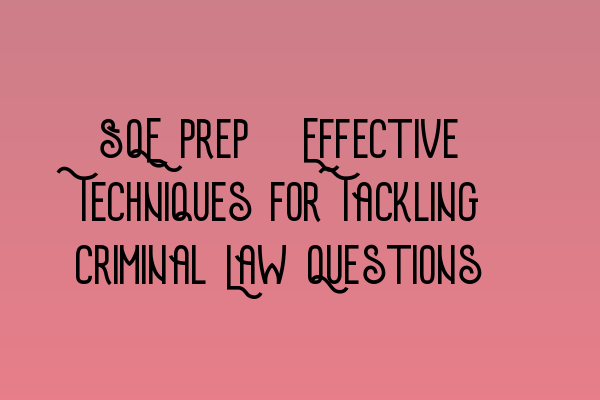SQE Prep: Effective Techniques for Tackling Criminal Law Questions
Preparing for the Solicitors Qualifying Examination (SQE) can be a daunting task, especially when it comes to tackling criminal law questions. However, with the right techniques and strategies, you can confidently navigate through these questions and excel in your SQE Criminal Law and Practice exams. In this blog post, we will discuss some effective techniques that will help you ace your criminal law questions.
1. Understand the Question
One of the most important techniques for tackling criminal law questions is to thoroughly understand the question being asked. Read the question carefully, paying attention to keywords and specific facts mentioned. Take note of the main issues and elements involved in the scenario. This will help you frame your answer in a concise and structured manner.
For example, let’s consider a hypothetical question about the elements of theft:
“John steals a valuable watch from a jewelry store. Discuss the elements of theft and explain whether John can be charged with this offense.”
In this scenario, the key elements to consider are the actus reus (the act of stealing) and the mens rea (the intention to permanently deprive). By identifying these elements, you can structure your answer accordingly.
2. Analyze and Apply the Law
Once you have understood the question, the next step is to analyze and apply the relevant criminal law principles. This involves identifying and referencing the applicable statutes, case precedents, and legal principles that are relevant to the scenario.
For example, in the theft scenario mentioned above, you can reference the Theft Act 1968 and relevant case law, such as Decoding Criminal Evidence Rules: A Detailed Analysis. Analyze how these legal provisions apply to the facts given in the question and discuss whether John’s actions fulfill the required elements of theft.
3. Use Case Examples
To strengthen your answers and demonstrate a deeper understanding of criminal law, incorporate relevant case examples into your response. This shows the examiners that you can apply legal principles to real-life scenarios.
For instance, if the question involves a scenario where self-defense is in question, you could discuss the case of R v. Bird (1985) to illustrate the principles of self-defense and how they may apply to the situation at hand.
4. Provide Well-Reasoned Arguments
When tackling criminal law questions, it is crucial to provide well-reasoned arguments to support your conclusions. This involves considering counter-arguments and addressing potential weaknesses in your analysis.
For example, if you are discussing whether John can be charged with theft, consider potential defenses or legal arguments that could be raised on his behalf. Address these counter-arguments and explain why they may or may not be successful.
5. Practice Active Reading and Writing
Improving your reading and writing skills is essential for effectively tackling criminal law questions. Practice active reading by critically analyzing legal texts, cases, and articles. Take notes on key points and concepts that you come across, as these can be useful references during the exam.
Furthermore, practice writing clear, concise, and well-structured answers. Use headings, paragraphs, and bullet points to organize your thoughts and make your answer easily readable. This allows the examiners to follow your arguments and ensures you do not miss any important points.
Conclusion
Tackling criminal law questions in the SQE Criminal Law and Practice exams requires a combination of understanding the question, analyzing the law, incorporating case examples, providing well-reasoned arguments, and practicing active reading and writing. By implementing these techniques, you will be well-prepared to confidently approach and succeed in your criminal law questions.
For further resources and support in your SQE Criminal Law and Practice preparation, consider attending our Workshops and Seminars on Criminal Practice: Expanding Your Expertise or enhancing your study group experience with Enhancing Your SQE Criminal Law Study Group Experience. Additionally, gain a deeper understanding of the criminal justice system in the UK by exploring Public Prosecutions in the UK: A Closer Look at State Prosecution and an inside look at UK Police Procedures in Criminal Cases.
